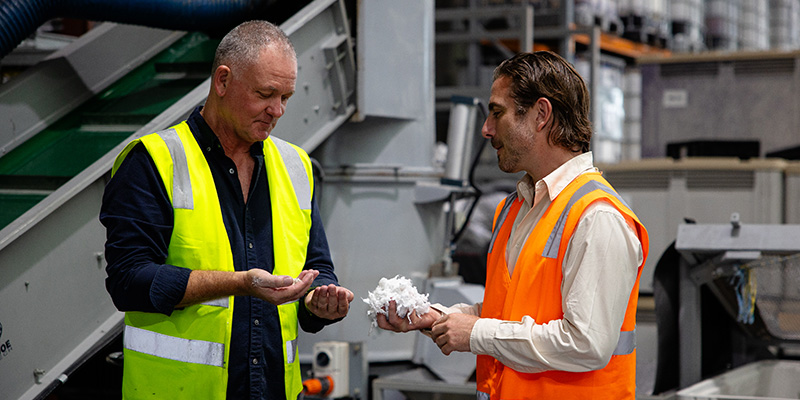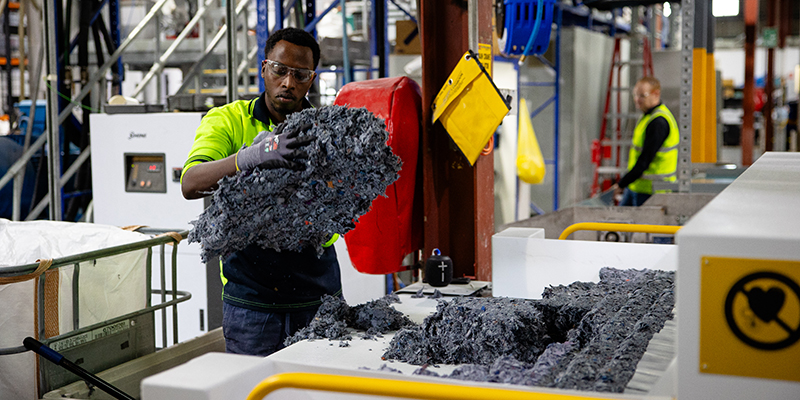In Australia about a million tonnes of textiles go into landfill and it's projected globally by 2030, that number will raise to 140 million tonnes per year, which is just frightening.
Block Texx’s mission is very simple – divert textiles away from landfill.
Block Texx is a clean technology company, and what we do, we've developed a technology to separate the hard to recycle blended fabrics that we use every day.
Our IP protection obviously is continually in development because we're a cutting-edge technology.
Our chemical separation process is called SOFT and it's an acronym for Separation of Fibre Technology.
We've used low grade chemical process combined with a variety of conditions to allow us to unlock the cotton from the polyester.
Our ability to unlock the polyester from the cotton and get that back into a recycle stream is really critical for that transition.
BlockTexx has currently got 5 registered trademarks: BlockTexx, our name; Polytexx; our cellulose brand, Celltexx; blockchain process, TraceTexx and our wonderful business to consumer initiative we do with local councils all over Australia called Give a sheet for the Planet.
Blocktexx looked at both registering the trademarks by ourselves and also what it would cost to use a trademark attorney.
Think if you're an early-stage founder without the experience, I would advise that you go and seek the right amount of expertise.
We currently have 2 patients pending.
The patents are really important not only from the comfortability for our investors, but equally important as a business to show maturity that you have thought about what you're trying to build, how do you protect it and to ensure that you're not infringing in somebody else's patents.
It's been a roller coaster of success and failure.
Ultimately we see this as the stepping stone into building Australia's first textile recycling industry.
BlockTexx should be a verb – if you've got unwanted textiles, BlockTexx it.
In the heart of Australia's clean technology sector, BlockTexx® is revolutionising textile recycling with its innovative approach to IP. Co-founded by Graham Ross and Adrian Jones, BlockTexx® has developed a proprietary technology that addresses the pressing issue of textile waste. Their journey, marked by a strong IP strategy, offers valuable insights into how IP can drive innovation and sustainability.
The genesis of BlockTexx®
BlockTexx's® story began with a simple yet ambitious mission: to divert textiles from landfill. The company has developed a technology to separate hard-to-recycle blended fabrics, such as those found in everyday items like sheets, towels, and clothing. This innovation is not just about recycling; it's about creating a sustainable textile recycling industry in Australia, Ross says.
'Our mission has never changed. It's really simple—divert textiles from landfill.'
Innovative technology and IP
BlockTexx® holds a patent for their innovative chemical separation process, Separation of Fibre Technology (S.O.F.T.), which allows them to separate cotton from polyester in blended fabrics. This process is crucial because it enables the recycling of both materials without sacrificing one for the other. 'We didn't want to create a business that created another problem,' explains Ross. The technology has been developed in collaboration with leading universities, including Queensland University of Technology and the University of Queensland.
BlockTexx's® commitment to innovation is reflected in their robust IP strategy. The company currently holds 5 registered trade marks, including BlockTexx®, PolyTexx®, CellTexx®, TraceTexx®, and their consumer initiative, Give a Sheet for the Planet®. These trade marks not only protect their brand but also signify their dedication to transparency and trust in the recycling process.
Navigating the patent landscape
Securing IP protection was a critical step in BlockTexx's® journey. The founders quickly realised that having a patent was not just a milestone but a necessity for attracting investors and securing funding.
‘Often the word patent comes up when you look at external fundraising or even grant funding,’ Ross explains. ‘Some investors are really focused on you having a patent, while others just want to know that you are underway with your patent understanding.’
The patent journey was not without its challenges. The founders had to balance the demands of developing their technology with the rigorous requirements of the patent process. They engaged a patent attorney to navigate the complexities and ensure their innovations were adequately protected. This strategic approach allowed them to focus on both the protection and preparation for full patent filing.
Challenges and triumphs
The path to innovation is rarely smooth, and BlockTexx® has been no exception. One of the significant challenges they faced was developing a technology that could handle the diverse range of textiles in the market. 'We had to ensure our technology could adapt to different thicknesses and types of materials,' says Ross.
Despite these hurdles, BlockTexx® has made remarkable progress, celebrating their 7-year anniversary and continuing to push the boundaries of textile recycling.
Impact and future vision
BlockTexx's® innovative approach has not gone unnoticed. The company recently won the InnovationAus Australian Hero Award, a testament to its pioneering work in the green economy.
Looking ahead, BlockTexx® aims to expand their operations and continue innovating. Their vision includes building Australia's first large-scale textile recycling industry, which will not only create jobs but also set a precedent for sustainable practices in the sector.
‘There's a huge opportunity to turn this into a really sizable industry,’ Ross notes.
BlockTexx's® story is one that demonstrates the power of innovation, collaboration, and a strong IP strategy. Their journey from a simple idea to a burgeoning force in textile recycling highlights the importance of protecting and leveraging IP to drive sustainable change. As they continue to grow and innovate, BlockTexx® remains committed to their mission of diverting textiles from landfill and building a sustainable future for all.
BlockTexx® is featured in this year's IP Report as an example of IP driving sustainable innovation.


